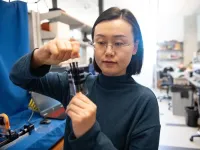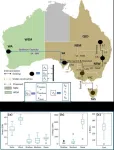(Press-News.org) Researchers working on solutions for antifungal resistance are being encouraged to apply to a new £3.4 million fund led by the University of Exeter with UK government funding.
The new fund, called FAILSAFE (Fungal AMR Innovations for LMICS: Solutions and Access For Everyone), is being launched by the University of Exeter’s MRC Centre for Medical Mycology, in partnership with the UK Department of Health and Social Care’s Global AMR Innovation Fund (GAMRIF).
Life-threatening fungal diseases take as many lives annually as TB or malaria, but the organisms that cause them are understudied, and the number of drugs available to treat them is worryingly limited. Considering this threat, increasing frequencies of antifungal drug resistance amongst fungi in the natural environment and in patients undergoing hospital treatment means even fewer drugs are effective. This is a major cause for global concern, and part of a wider global threat of antimicrobial resistance (AMR), which includes resistance to antibacterial drugs.
Antifungal drug resistance is a huge threat not only to human health, where some fungi are particularly deadly to people with compromised immune systems, including children with leukaemia, but also to global food security as resistant fungal pathogens can affect a broad range of species of animals and plants and therefore essential crops for the human food supply.
Solutions for antifungal drug resistance are urgently needed, and the new FAILSAFE project is aiming to address this issue. GAMRIF is a One Health UK Aid fund that supports research and development around the world to reduce the threat of antimicrobial resistance in humans, animals and the environment for the benefit of people in low- and middle-income countries.
GAMRIF is partnering with the University of Exeter’s MRC Centre for Medical Mycology (MRC CMM), as it currently represents more than 30 per cent of UK scientists working in medical mycology and is one of the largest medical mycology groupings worldwide. The Centre’s overarching mission is to deliver world-leading research that will substantially advance our understanding of fungal pathogenesis, host immunity and disease phenotypes, thereby enabling the generation and utilisation of skills and knowledge that will improve the prevention, diagnosis and treatment of fungal diseases in the future.
Professor Gordon Brown, of the University of Exeter, is principal investigator on the project. He said: “It’s wonderful to now have resources that will help to generate products and solutions that tackle antifungal drug resistance in low- and middle-income countries, which suffer the highest burdens of human fungal infections.”
Professor Elaine Bignell, Co-Director of Centre and FAILSAFE Co-Lead said: “Suppression of fungal diseases and drug resistance requires coordinated global research and development efforts. FAILSAFE will provide critical support for this and help to build a global network focusing on sustainable solutions and training, that will be developed and delivered in the many unique contexts in which fungal infections destroy lives.”
Professor Dame Sally Davies, UK Special Envoy for AMR, said: “Antifungal drug resistance is a pressing, understudied global threat for which urgent solutions must be sought. I am proud that the UK Government, through GAMRIF, is taking action and establishing FAILSAFE with the MRC CMM – a world-leading centre for fungal research. This global initiative will be vital to accelerate One Health fungal innovations and solutions in the fight against antimicrobial resistance.”
The FAILSAFE project will distribute its funds to innovative projects that deliver products or solutions for AFR, led by researchers from across the globe. Bids for this first round of available funds are currently welcomed, and prospective applicants are encouraged to find out more here before the July deadline. Project funds will support cutting-edge research and development that focuses on, the generation of products or solutions to mitigate the consequences of AFR, the development of innovative One Health solutions to tackle AFR, increased availability of context-specific, accessible and affordable innovations for low and middle-income countries, establishment of international research partnerships with industry, academia and governments, or to collaborate with and leverage additional funding from other global donors.
The FAILSAFE project is one of many initiatives led by the MRC CMM, of which Professor Brown is the Director. The MRC CMM is actively working to increase capacity in medical mycology, particularly in those parts of the world which suffer high burdens of fungal disease. To facilitate this, the Centre has developed a unit in Africa, with another unit launching later this year in South America. These international units facilitate collaboration with colleagues across the globe, tackling fungal diseases endemic to the geographical regions in which they are located and bringing together interdisciplinary research.
FAILSAFE aligns with government priorities and the G20 summit scheduled to take place later this year in Brazil, supporting global health systems and fighting high rates of infectious disease in low- and middle-income countries. Get in touch with the FAILSAFE team by emailing Failsafe@exeter.ac.uk and by visiting www.cmm-failsafe.com/contact/.
END
Exeter announces new £3.4 million global funding for solutions to antifungal drug resistance
The new fund, called FAILSAFE (Fungal AMR Innovations for LMICS: Solutions and Access For Everyone), is being launched by the University of Exeter’s MRC Centre for Medical Mycology, in partnership with the UK Department of Health and Social Care’s G
2024-05-03
ELSE PRESS RELEASES FROM THIS DATE:
In medieval England, leprosy spread between red squirrels and people, genome evidence shows
2024-05-03
Evidence from archaeological sites in the medieval English city of Winchester shows that English red squirrels once served as an important host for Mycobacterium leprae strains that caused leprosy in people, researchers report May 3 in the journal Current Biology.
“With our genetic analysis we were able to identify red squirrels as the first ancient animal host of leprosy,” says senior author Verena Schuenemann of the University of Basel in Switzerland. “The medieval red squirrel strain we recovered is more closely related to medieval human strains from the same city than to strains isolated from infected ...
Source of pregnancy complications from infections revealed by placenta map
2024-05-03
The first panoramic view of infection pathways in the human placenta has been created, which could highlight potential drug targets to develop pregnancy-safe therapies for malaria, toxoplasmosis and listeria, all diseases that can cause severe pregnancy complications.
Researchers from the Wellcome Sanger Institute, the University of Cambridge, the University of Dundee, and collaborators, used novel ‘mini placenta’ models to map the placental response to infections in early development. This ...
Lepra in the middle ages: New insights on transmission pathways through squirrels
2024-05-03
Researchers at the University of Basel and the University of Zurich have been able to prove that British squirrels carried leprosy bacteria as early as the Middle Ages. Further results revealed a link between the pathogens found in the medieval rodents and those in the local human population during that period.
Skin spots, deformed noses, ulcers: leprosy, is an infectious disease that can bring about some serious symptoms. The bacterium responsible, Mycobacterium leprae, which still infects around 200,000 people each year especially in the Global South, also has a long history in Europe. The international research group led by paleogeneticist Professor Verena Schünemann ...
The Foundational Questions Institute, FQxI, appoints Pinar Emirdag to Board of Directors
2024-05-03
The Foundational Questions Institute, FQxI, a philanthropically-funded science funding agency and think tank, is delighted to announce that Dr Pinar Emirdag has been appointed to the Institute’s Board of Directors.
Emirdag, a financial services executive and entrepreneur, is currently director of Hupomone Ventures, having previously spearheaded industry-changing initiatives at institutions such as JP Morgan, Citi and the London Stock Exchange and at start-ups including Lava Trading and Clearmatics. FQxI’s Chief Operating Officer Kavita ...
Stretchable e-skin could give robots human-level touch sensitivity
2024-05-03
A first-ever stretchy electronic skin could equip robots and other devices with the same softness and touch sensitivity as human skin, opening up new possibilities to perform tasks that require a great deal of precision and control of force.
The new stretchable e-skin, developed by researchers at The University of Texas at Austin, solves a major bottleneck in the emerging technology. Existing e-skin technology loses sensing accuracy as the material stretches, but that is not the case with this new version.
"Much like human skin has to stretch and bend ...
Researchers collaborate with the shipping industry to cut costs, fuel consumption and greenhouse gas emissions in shipping
2024-05-03
A common challenge in shipping occurs when ships arrive promptly at their destination, only to find a crowded harbour. Subsequently, they are often required to wait outside the harbour or anchor until port services and a quayside become available.
According to a report from the International Maritime Organization (IMO), it is not uncommon for ships to spend between 5-10% of their time waiting to enter port. Excessive speeds followed by extended waiting times with engines running result in a notable increase in fuel consumption. This is a problem that impacts both the climate and the economy.
Several European universities, ports, shipping companies and technology firms have now joined forces ...
Towards transparent and antimicrobial surfaces for touch displays
2024-05-03
The interest in antimicrobial solutions for personal and multi-user touch screens, such as tablets and mobile devices, has grown in recent years. Traditional methods like sprayable alcohols or wipes are not ideal for these delicate displays. Antimicrobial coatings applied directly to the glass are a promising alternative, but only if they are transparent and long-lasting. Previous proposed coating solutions, such as photocatalytic metal oxides (e.g., TiO2 and ZnO), have posed some challenges. Additionally, these coatings typically require light and moisture to be antimicrobial and eliminate the microbes present on the surface.
Copper ...
Number of male Oxbridge students from elite schools declined significantly in the middle of the twentieth century, study shows
2024-05-03
The number of male students at the University of Oxford from elite schools declined significantly by the middle of the twentieth century, a new study shows.
In contrast the proportion of female students remained steady. Those with fathers with professional jobs rose dramatically by the 1960s, according to the analysis.
At the beginning of the century around 25 to 35 per cent had fathers in professional occupations. This had risen to around 50 per cent among those arriving at Oxford in the 1960s.
The research, published in the journal Gender & History, was ...
A cost-efficient path to a renewable energy grid for Australia
2024-05-03
A model charts the most cost-efficient path to a fully renewable electricity grid for Australia. Raheel Ahmed Shaikh and colleagues modeled possible scenarios for Australia’s eastern and western grids, using solar and wind generation, short-to-long-term energy storage, and financial input data to explore low-cost capacity mix. Going completely renewable would require significant expansion of both generation and storage. Interconnecting the two grids would reduce generation capacity needs by 6% and storage power capacity needs by 14%. The least cost renewable-only grid would be dominated by wind, ...
Leadership in MS Rehabilitation recognized: John DeLuca, PhD, awarded 2024 Giants of MS® Honor
2024-05-03
East Hanover, NJ – May 3, 2024 – John DeLuca, PhD, of Kessler Foundation was named recipient of the 2024 Giants of Multiple Sclerosis® award for rehabilitation. He was one of seven inductees announced by NeurologyLive® and the Consortium of Multiple Sclerosis Centers (CMSC) this week. Dr. DeLuca is senior vice president, Research and Training at the Foundation and a professor in the departments of Physical Medicine & Rehabilitation and Neurology at Rutgers New Jersey Medical School.
Established in 2021, the Giants of Multiple Sclerosis award honors trailblazers, innovators, and visionaries ...
LAST 30 PRESS RELEASES:
Call me invasive: New evidence confirms the status of the giant Asian mantis in Europe
Scientists discover a key mechanism regulating how oxytocin is released in the mouse brain
Public and patient involvement in research is a balancing act of power
Scientists discover “bacterial constipation,” a new disease caused by gut-drying bacteria
DGIST identifies “magic blueprint” for converting carbon dioxide into resources through atom-level catalyst design
COVID-19 vaccination during pregnancy may help prevent preeclampsia
Menopausal hormone therapy not linked to increased risk of death
Chronic shortage of family doctors in England, reveals BMJ analysis
Booster jabs reduce the risks of COVID-19 deaths, study finds
Screening increases survival rate for stage IV breast cancer by 60%
ACC announces inaugural fellow for the Thad and Gerry Waites Rural Cardiovascular Research Fellowship
University of Oklahoma researchers develop durable hybrid materials for faster radiation detection
Medicaid disenrollment spikes at age 19, study finds
Turning agricultural waste into advanced materials: Review highlights how torrefaction could power a sustainable carbon future
New study warns emerging pollutants in livestock and aquaculture waste may threaten ecosystems and public health
Integrated rice–aquatic farming systems may hold the key to smarter nitrogen use and lower agricultural emissions
Hope for global banana farming in genetic discovery
Mirror image pheromones help beetles swipe right
Prenatal lead exposure related to worse cognitive function in adults
Research alert: Understanding substance use across the full spectrum of sexual identity
Pekingese, Shih Tzu and Staffordshire Bull Terrier among twelve dog breeds at risk of serious breathing condition
Selected dog breeds with most breathing trouble identified in new study
Interplay of class and gender may influence social judgments differently between cultures
Pollen counts can be predicted by machine learning models using meteorological data with more than 80% accuracy even a week ahead, for both grass and birch tree pollen, which could be key in effective
Rewriting our understanding of early hominin dispersal to Eurasia
Rising simultaneous wildfire risk compromises international firefighting efforts
Honey bee "dance floors" can be accurately located with a new method, mapping where in the hive forager bees perform waggle dances to signal the location of pollen and nectar for their nestmates
Exercise and nutritional drinks can reduce the need for care in dementia
Michelson Medical Research Foundation awards $750,000 to rising immunology leaders
SfN announces Early Career Policy Ambassadors Class of 2026
[Press-News.org] Exeter announces new £3.4 million global funding for solutions to antifungal drug resistanceThe new fund, called FAILSAFE (Fungal AMR Innovations for LMICS: Solutions and Access For Everyone), is being launched by the University of Exeter’s MRC Centre for Medical Mycology, in partnership with the UK Department of Health and Social Care’s G






